POLITICAL SCIENCE: Essay on Political Socialization and Parties
VerifiedAdded on 2023/01/05
|7
|1455
|80
Essay
AI Summary
This political science essay examines the concept of political socialization, defining it as the process by which individuals acquire political values and knowledge. It highlights the four main forms of political socialization: family, schools, peer groups, and mass media, with a particular emphasis on the significant role of mass media in the modern world. The essay discusses the evolution of media from print to digital formats, emphasizing how digital channels, especially social media, have broadened exposure to global politics, influencing political attitudes and beliefs. The second part of the essay compares brokerage and programmatic parties, two distinct types of political party structures. Brokerage parties are characterized as intermediary parties that aim to appeal to a broad range of voters without a strong ideological stance, while programmatic parties are defined by their adherence to a consistent ideological position. The essay provides examples of these party types in Canada, such as the Liberal and Conservative parties as brokerage parties and the New Democratic Party (NDP) and the Reform/Canadian Alliance Party as programmatic parties, illustrating their differing approaches to gaining public support and maintaining ideological consistency. References are provided for further reading.
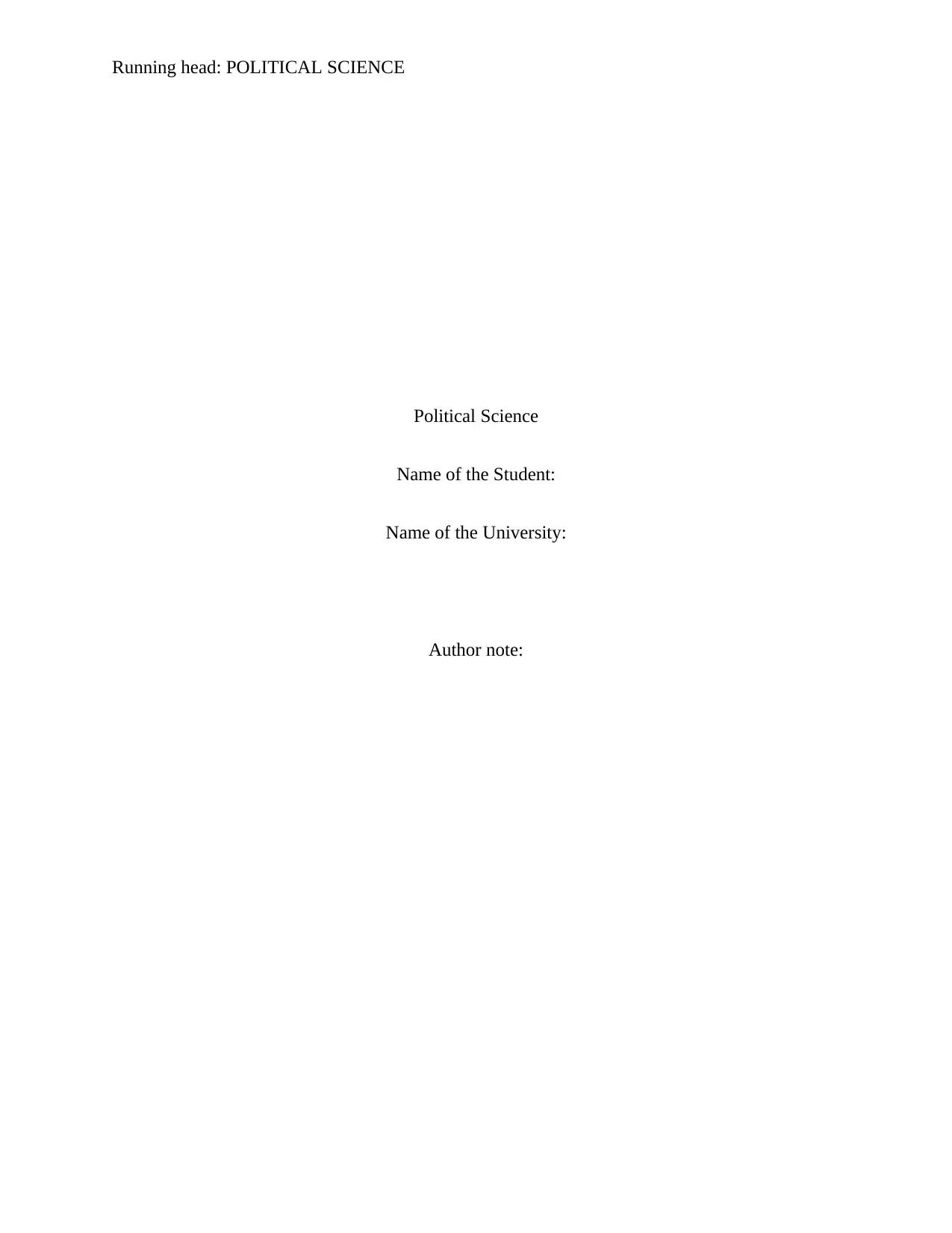
Running head: POLITICAL SCIENCE
Political Science
Name of the Student:
Name of the University:
Author note:
Political Science
Name of the Student:
Name of the University:
Author note:
Paraphrase This Document
Need a fresh take? Get an instant paraphrase of this document with our AI Paraphraser
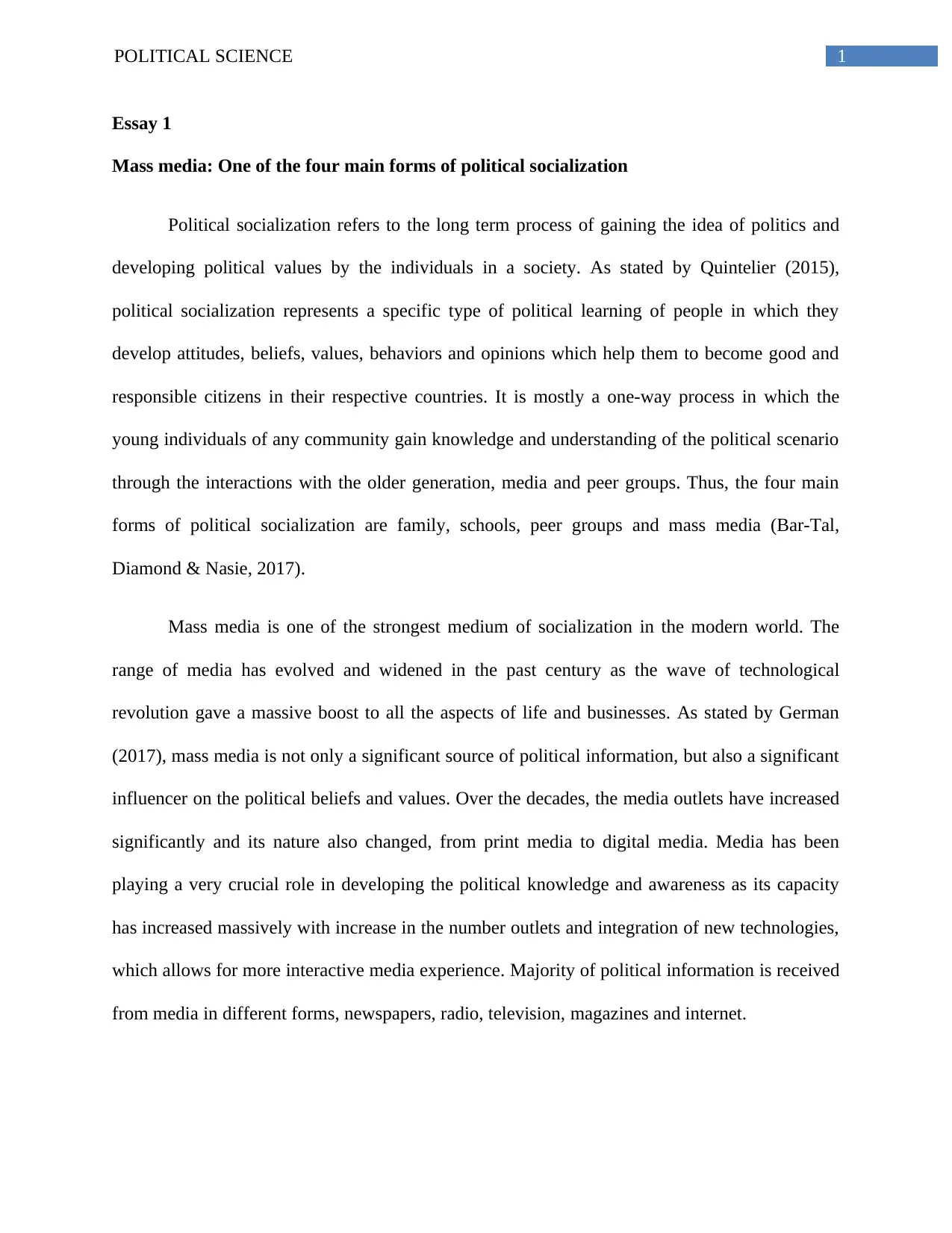
1POLITICAL SCIENCE
Essay 1
Mass media: One of the four main forms of political socialization
Political socialization refers to the long term process of gaining the idea of politics and
developing political values by the individuals in a society. As stated by Quintelier (2015),
political socialization represents a specific type of political learning of people in which they
develop attitudes, beliefs, values, behaviors and opinions which help them to become good and
responsible citizens in their respective countries. It is mostly a one-way process in which the
young individuals of any community gain knowledge and understanding of the political scenario
through the interactions with the older generation, media and peer groups. Thus, the four main
forms of political socialization are family, schools, peer groups and mass media (Bar-Tal,
Diamond & Nasie, 2017).
Mass media is one of the strongest medium of socialization in the modern world. The
range of media has evolved and widened in the past century as the wave of technological
revolution gave a massive boost to all the aspects of life and businesses. As stated by German
(2017), mass media is not only a significant source of political information, but also a significant
influencer on the political beliefs and values. Over the decades, the media outlets have increased
significantly and its nature also changed, from print media to digital media. Media has been
playing a very crucial role in developing the political knowledge and awareness as its capacity
has increased massively with increase in the number outlets and integration of new technologies,
which allows for more interactive media experience. Majority of political information is received
from media in different forms, newspapers, radio, television, magazines and internet.
Essay 1
Mass media: One of the four main forms of political socialization
Political socialization refers to the long term process of gaining the idea of politics and
developing political values by the individuals in a society. As stated by Quintelier (2015),
political socialization represents a specific type of political learning of people in which they
develop attitudes, beliefs, values, behaviors and opinions which help them to become good and
responsible citizens in their respective countries. It is mostly a one-way process in which the
young individuals of any community gain knowledge and understanding of the political scenario
through the interactions with the older generation, media and peer groups. Thus, the four main
forms of political socialization are family, schools, peer groups and mass media (Bar-Tal,
Diamond & Nasie, 2017).
Mass media is one of the strongest medium of socialization in the modern world. The
range of media has evolved and widened in the past century as the wave of technological
revolution gave a massive boost to all the aspects of life and businesses. As stated by German
(2017), mass media is not only a significant source of political information, but also a significant
influencer on the political beliefs and values. Over the decades, the media outlets have increased
significantly and its nature also changed, from print media to digital media. Media has been
playing a very crucial role in developing the political knowledge and awareness as its capacity
has increased massively with increase in the number outlets and integration of new technologies,
which allows for more interactive media experience. Majority of political information is received
from media in different forms, newspapers, radio, television, magazines and internet.
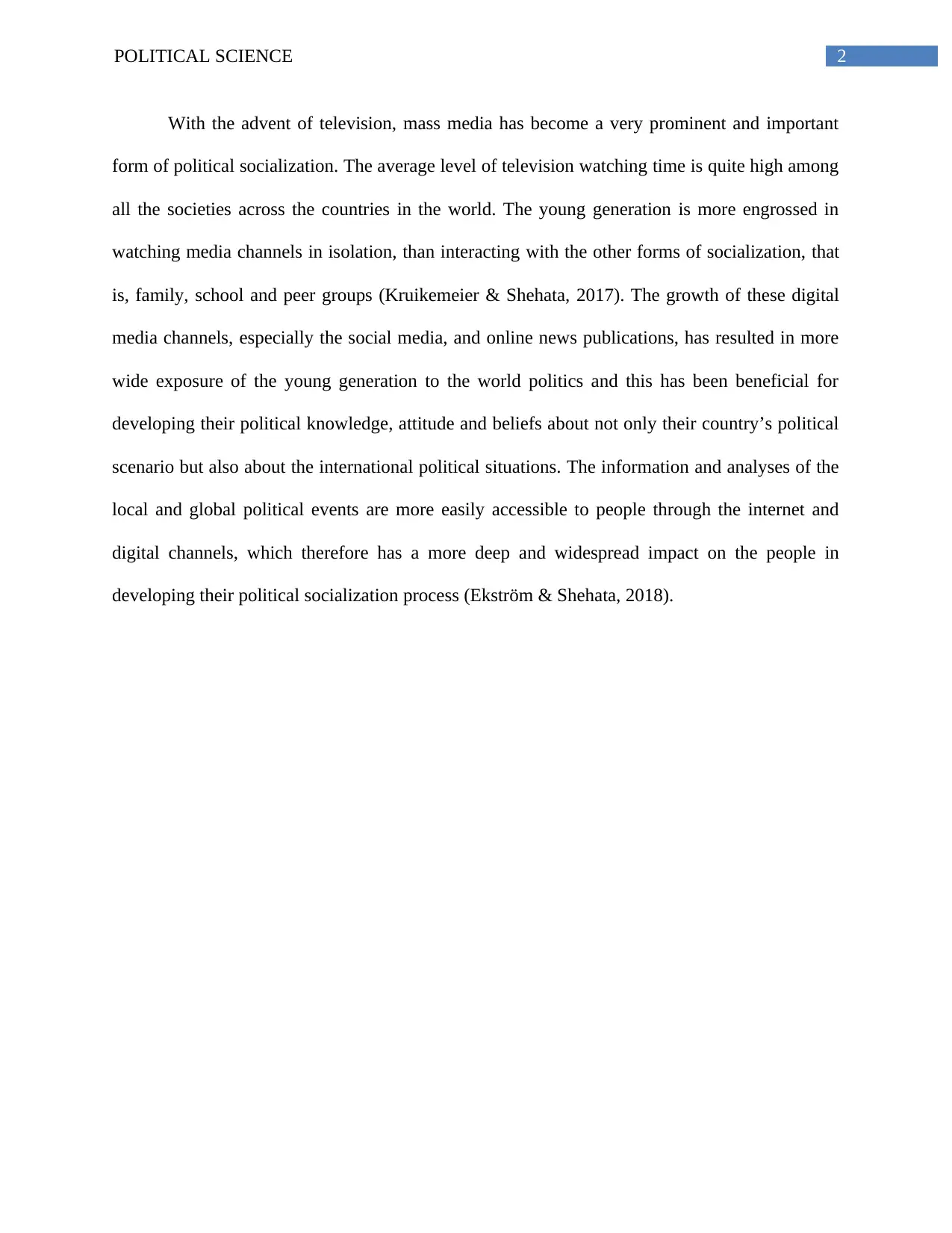
2POLITICAL SCIENCE
With the advent of television, mass media has become a very prominent and important
form of political socialization. The average level of television watching time is quite high among
all the societies across the countries in the world. The young generation is more engrossed in
watching media channels in isolation, than interacting with the other forms of socialization, that
is, family, school and peer groups (Kruikemeier & Shehata, 2017). The growth of these digital
media channels, especially the social media, and online news publications, has resulted in more
wide exposure of the young generation to the world politics and this has been beneficial for
developing their political knowledge, attitude and beliefs about not only their country’s political
scenario but also about the international political situations. The information and analyses of the
local and global political events are more easily accessible to people through the internet and
digital channels, which therefore has a more deep and widespread impact on the people in
developing their political socialization process (Ekström & Shehata, 2018).
With the advent of television, mass media has become a very prominent and important
form of political socialization. The average level of television watching time is quite high among
all the societies across the countries in the world. The young generation is more engrossed in
watching media channels in isolation, than interacting with the other forms of socialization, that
is, family, school and peer groups (Kruikemeier & Shehata, 2017). The growth of these digital
media channels, especially the social media, and online news publications, has resulted in more
wide exposure of the young generation to the world politics and this has been beneficial for
developing their political knowledge, attitude and beliefs about not only their country’s political
scenario but also about the international political situations. The information and analyses of the
local and global political events are more easily accessible to people through the internet and
digital channels, which therefore has a more deep and widespread impact on the people in
developing their political socialization process (Ekström & Shehata, 2018).
⊘ This is a preview!⊘
Do you want full access?
Subscribe today to unlock all pages.

Trusted by 1+ million students worldwide
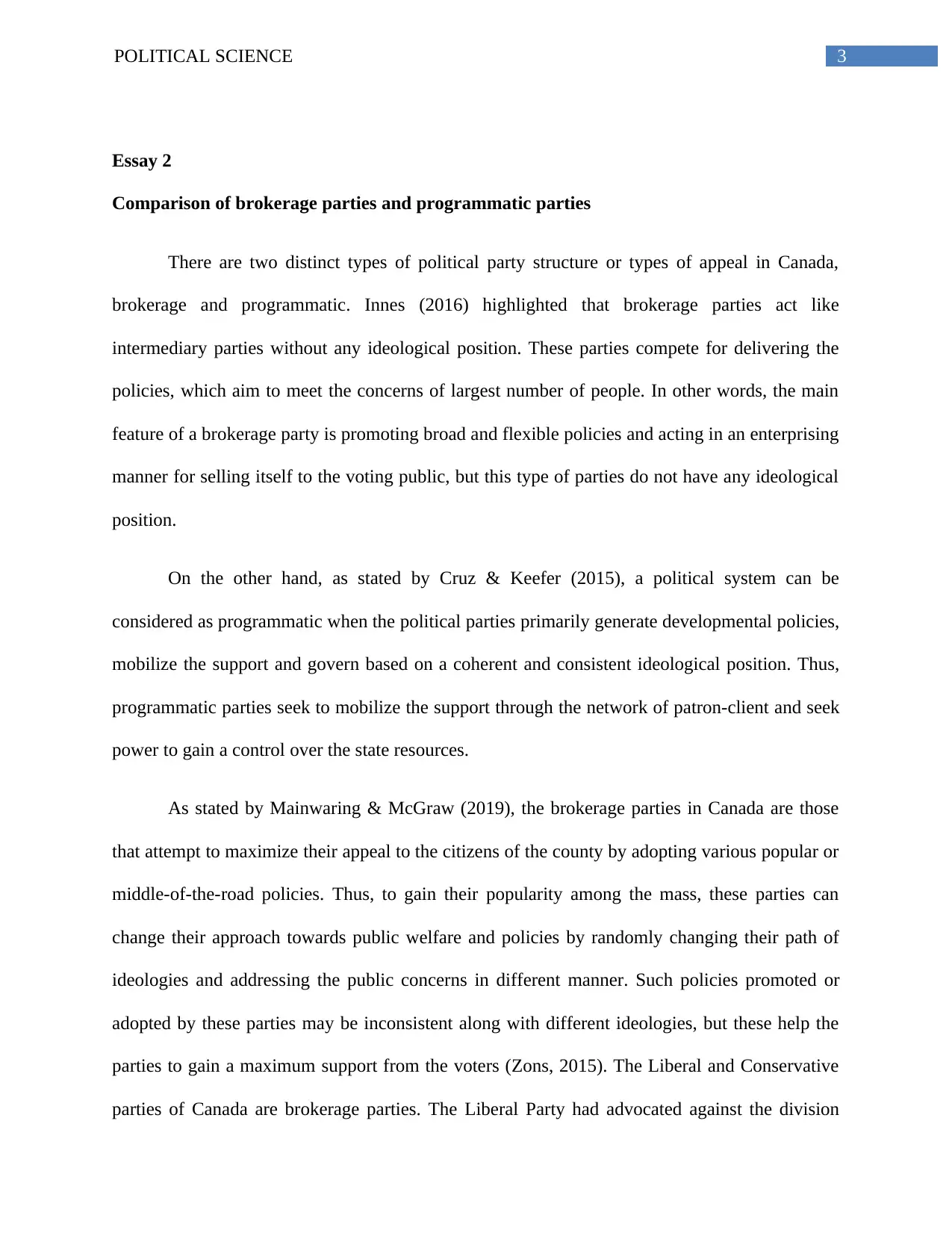
3POLITICAL SCIENCE
Essay 2
Comparison of brokerage parties and programmatic parties
There are two distinct types of political party structure or types of appeal in Canada,
brokerage and programmatic. Innes (2016) highlighted that brokerage parties act like
intermediary parties without any ideological position. These parties compete for delivering the
policies, which aim to meet the concerns of largest number of people. In other words, the main
feature of a brokerage party is promoting broad and flexible policies and acting in an enterprising
manner for selling itself to the voting public, but this type of parties do not have any ideological
position.
On the other hand, as stated by Cruz & Keefer (2015), a political system can be
considered as programmatic when the political parties primarily generate developmental policies,
mobilize the support and govern based on a coherent and consistent ideological position. Thus,
programmatic parties seek to mobilize the support through the network of patron-client and seek
power to gain a control over the state resources.
As stated by Mainwaring & McGraw (2019), the brokerage parties in Canada are those
that attempt to maximize their appeal to the citizens of the county by adopting various popular or
middle-of-the-road policies. Thus, to gain their popularity among the mass, these parties can
change their approach towards public welfare and policies by randomly changing their path of
ideologies and addressing the public concerns in different manner. Such policies promoted or
adopted by these parties may be inconsistent along with different ideologies, but these help the
parties to gain a maximum support from the voters (Zons, 2015). The Liberal and Conservative
parties of Canada are brokerage parties. The Liberal Party had advocated against the division
Essay 2
Comparison of brokerage parties and programmatic parties
There are two distinct types of political party structure or types of appeal in Canada,
brokerage and programmatic. Innes (2016) highlighted that brokerage parties act like
intermediary parties without any ideological position. These parties compete for delivering the
policies, which aim to meet the concerns of largest number of people. In other words, the main
feature of a brokerage party is promoting broad and flexible policies and acting in an enterprising
manner for selling itself to the voting public, but this type of parties do not have any ideological
position.
On the other hand, as stated by Cruz & Keefer (2015), a political system can be
considered as programmatic when the political parties primarily generate developmental policies,
mobilize the support and govern based on a coherent and consistent ideological position. Thus,
programmatic parties seek to mobilize the support through the network of patron-client and seek
power to gain a control over the state resources.
As stated by Mainwaring & McGraw (2019), the brokerage parties in Canada are those
that attempt to maximize their appeal to the citizens of the county by adopting various popular or
middle-of-the-road policies. Thus, to gain their popularity among the mass, these parties can
change their approach towards public welfare and policies by randomly changing their path of
ideologies and addressing the public concerns in different manner. Such policies promoted or
adopted by these parties may be inconsistent along with different ideologies, but these help the
parties to gain a maximum support from the voters (Zons, 2015). The Liberal and Conservative
parties of Canada are brokerage parties. The Liberal Party had advocated against the division
Paraphrase This Document
Need a fresh take? Get an instant paraphrase of this document with our AI Paraphraser
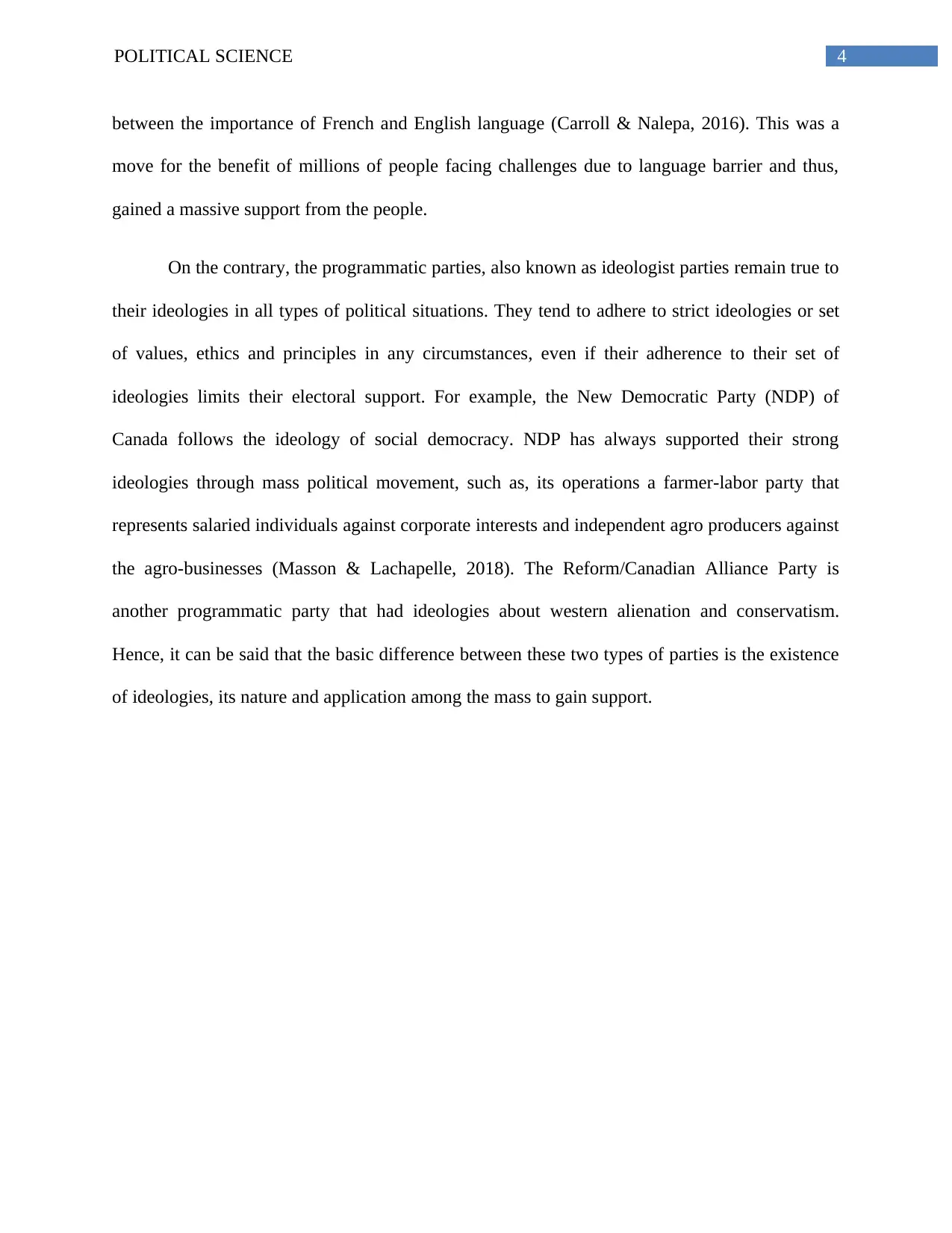
4POLITICAL SCIENCE
between the importance of French and English language (Carroll & Nalepa, 2016). This was a
move for the benefit of millions of people facing challenges due to language barrier and thus,
gained a massive support from the people.
On the contrary, the programmatic parties, also known as ideologist parties remain true to
their ideologies in all types of political situations. They tend to adhere to strict ideologies or set
of values, ethics and principles in any circumstances, even if their adherence to their set of
ideologies limits their electoral support. For example, the New Democratic Party (NDP) of
Canada follows the ideology of social democracy. NDP has always supported their strong
ideologies through mass political movement, such as, its operations a farmer-labor party that
represents salaried individuals against corporate interests and independent agro producers against
the agro-businesses (Masson & Lachapelle, 2018). The Reform/Canadian Alliance Party is
another programmatic party that had ideologies about western alienation and conservatism.
Hence, it can be said that the basic difference between these two types of parties is the existence
of ideologies, its nature and application among the mass to gain support.
between the importance of French and English language (Carroll & Nalepa, 2016). This was a
move for the benefit of millions of people facing challenges due to language barrier and thus,
gained a massive support from the people.
On the contrary, the programmatic parties, also known as ideologist parties remain true to
their ideologies in all types of political situations. They tend to adhere to strict ideologies or set
of values, ethics and principles in any circumstances, even if their adherence to their set of
ideologies limits their electoral support. For example, the New Democratic Party (NDP) of
Canada follows the ideology of social democracy. NDP has always supported their strong
ideologies through mass political movement, such as, its operations a farmer-labor party that
represents salaried individuals against corporate interests and independent agro producers against
the agro-businesses (Masson & Lachapelle, 2018). The Reform/Canadian Alliance Party is
another programmatic party that had ideologies about western alienation and conservatism.
Hence, it can be said that the basic difference between these two types of parties is the existence
of ideologies, its nature and application among the mass to gain support.
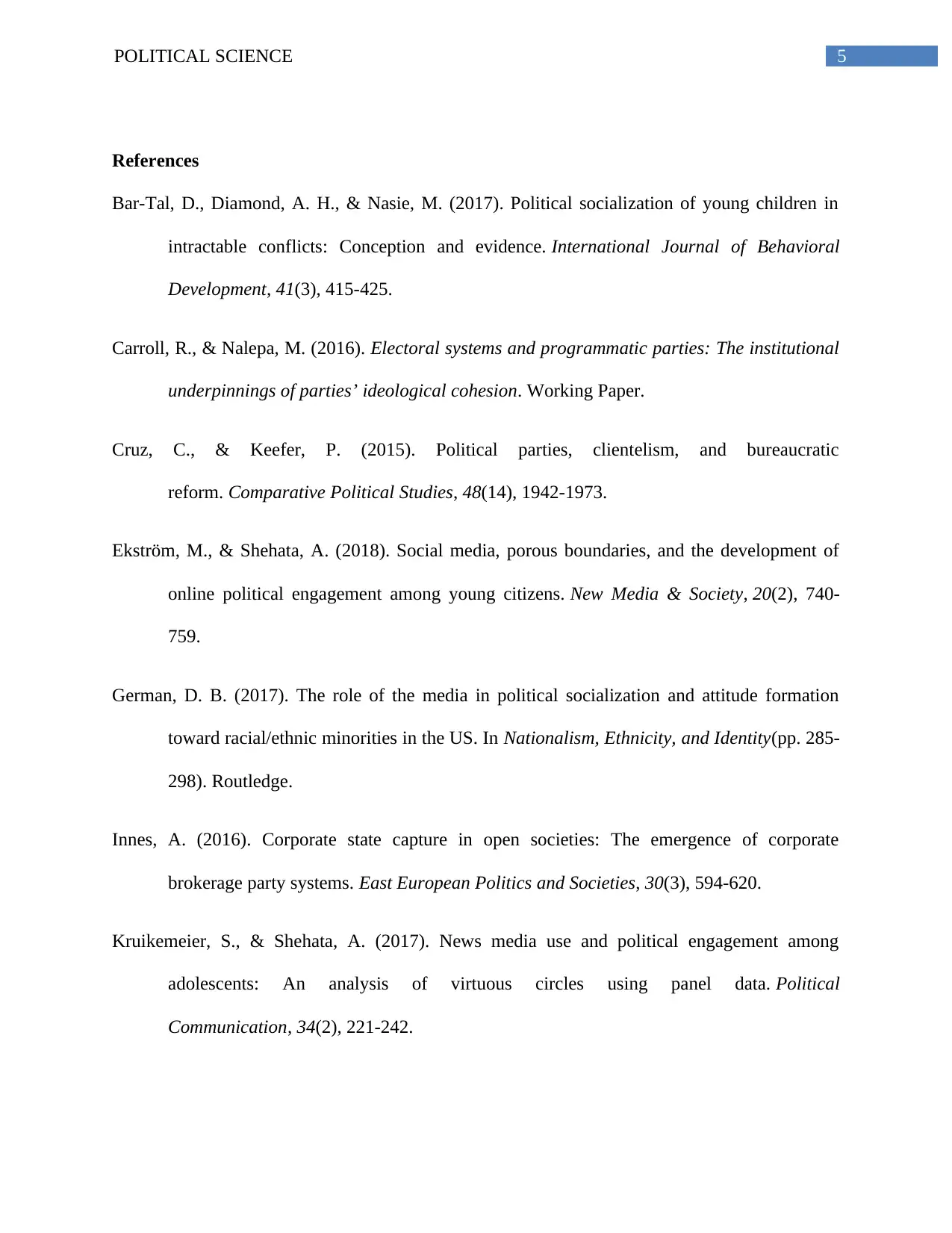
5POLITICAL SCIENCE
References
Bar-Tal, D., Diamond, A. H., & Nasie, M. (2017). Political socialization of young children in
intractable conflicts: Conception and evidence. International Journal of Behavioral
Development, 41(3), 415-425.
Carroll, R., & Nalepa, M. (2016). Electoral systems and programmatic parties: The institutional
underpinnings of parties’ ideological cohesion. Working Paper.
Cruz, C., & Keefer, P. (2015). Political parties, clientelism, and bureaucratic
reform. Comparative Political Studies, 48(14), 1942-1973.
Ekström, M., & Shehata, A. (2018). Social media, porous boundaries, and the development of
online political engagement among young citizens. New Media & Society, 20(2), 740-
759.
German, D. B. (2017). The role of the media in political socialization and attitude formation
toward racial/ethnic minorities in the US. In Nationalism, Ethnicity, and Identity(pp. 285-
298). Routledge.
Innes, A. (2016). Corporate state capture in open societies: The emergence of corporate
brokerage party systems. East European Politics and Societies, 30(3), 594-620.
Kruikemeier, S., & Shehata, A. (2017). News media use and political engagement among
adolescents: An analysis of virtuous circles using panel data. Political
Communication, 34(2), 221-242.
References
Bar-Tal, D., Diamond, A. H., & Nasie, M. (2017). Political socialization of young children in
intractable conflicts: Conception and evidence. International Journal of Behavioral
Development, 41(3), 415-425.
Carroll, R., & Nalepa, M. (2016). Electoral systems and programmatic parties: The institutional
underpinnings of parties’ ideological cohesion. Working Paper.
Cruz, C., & Keefer, P. (2015). Political parties, clientelism, and bureaucratic
reform. Comparative Political Studies, 48(14), 1942-1973.
Ekström, M., & Shehata, A. (2018). Social media, porous boundaries, and the development of
online political engagement among young citizens. New Media & Society, 20(2), 740-
759.
German, D. B. (2017). The role of the media in political socialization and attitude formation
toward racial/ethnic minorities in the US. In Nationalism, Ethnicity, and Identity(pp. 285-
298). Routledge.
Innes, A. (2016). Corporate state capture in open societies: The emergence of corporate
brokerage party systems. East European Politics and Societies, 30(3), 594-620.
Kruikemeier, S., & Shehata, A. (2017). News media use and political engagement among
adolescents: An analysis of virtuous circles using panel data. Political
Communication, 34(2), 221-242.
⊘ This is a preview!⊘
Do you want full access?
Subscribe today to unlock all pages.

Trusted by 1+ million students worldwide
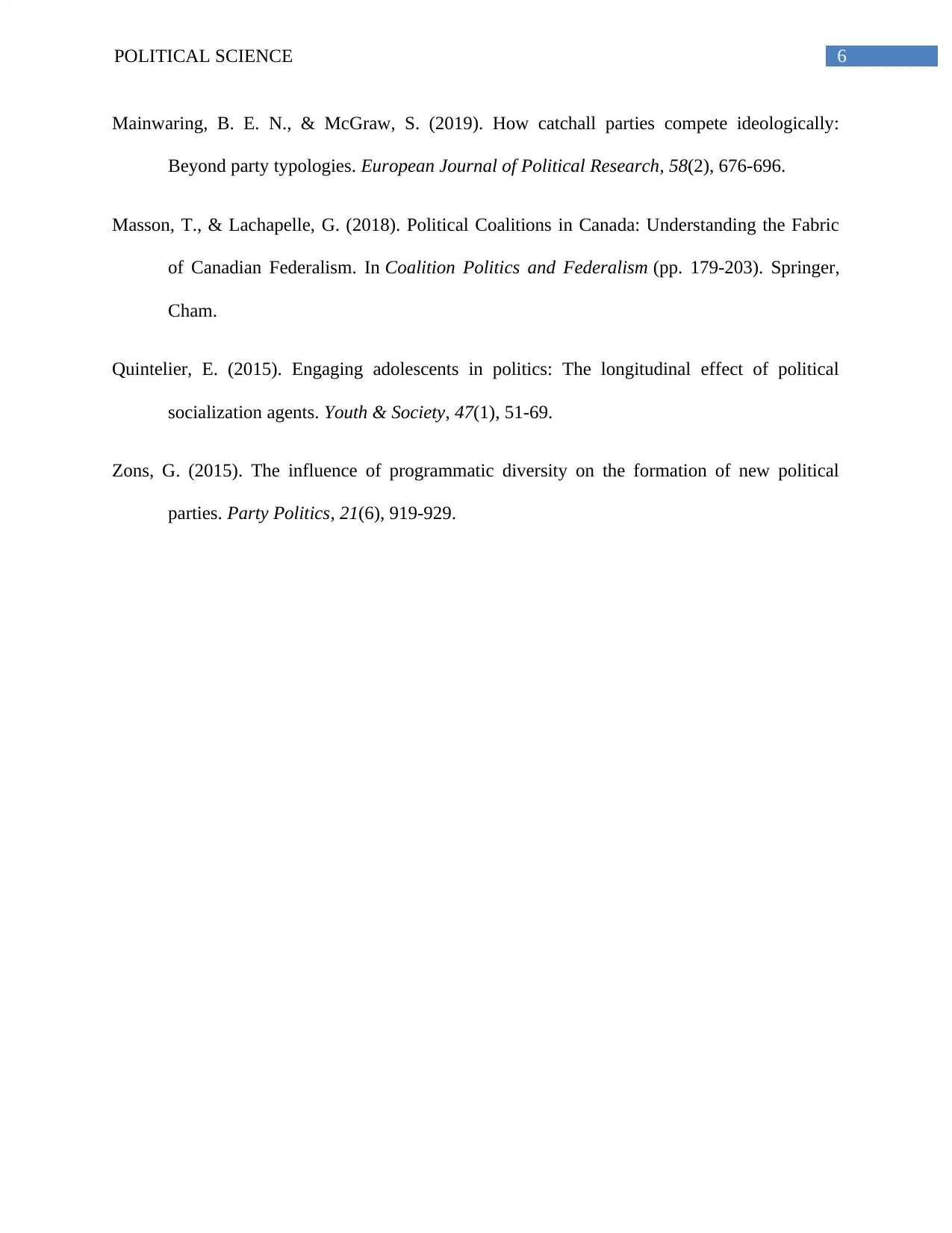
6POLITICAL SCIENCE
Mainwaring, B. E. N., & McGraw, S. (2019). How catchall parties compete ideologically:
Beyond party typologies. European Journal of Political Research, 58(2), 676-696.
Masson, T., & Lachapelle, G. (2018). Political Coalitions in Canada: Understanding the Fabric
of Canadian Federalism. In Coalition Politics and Federalism (pp. 179-203). Springer,
Cham.
Quintelier, E. (2015). Engaging adolescents in politics: The longitudinal effect of political
socialization agents. Youth & Society, 47(1), 51-69.
Zons, G. (2015). The influence of programmatic diversity on the formation of new political
parties. Party Politics, 21(6), 919-929.
Mainwaring, B. E. N., & McGraw, S. (2019). How catchall parties compete ideologically:
Beyond party typologies. European Journal of Political Research, 58(2), 676-696.
Masson, T., & Lachapelle, G. (2018). Political Coalitions in Canada: Understanding the Fabric
of Canadian Federalism. In Coalition Politics and Federalism (pp. 179-203). Springer,
Cham.
Quintelier, E. (2015). Engaging adolescents in politics: The longitudinal effect of political
socialization agents. Youth & Society, 47(1), 51-69.
Zons, G. (2015). The influence of programmatic diversity on the formation of new political
parties. Party Politics, 21(6), 919-929.
1 out of 7
Related Documents
Your All-in-One AI-Powered Toolkit for Academic Success.
+13062052269
info@desklib.com
Available 24*7 on WhatsApp / Email
![[object Object]](/_next/static/media/star-bottom.7253800d.svg)
Unlock your academic potential
Copyright © 2020–2026 A2Z Services. All Rights Reserved. Developed and managed by ZUCOL.



